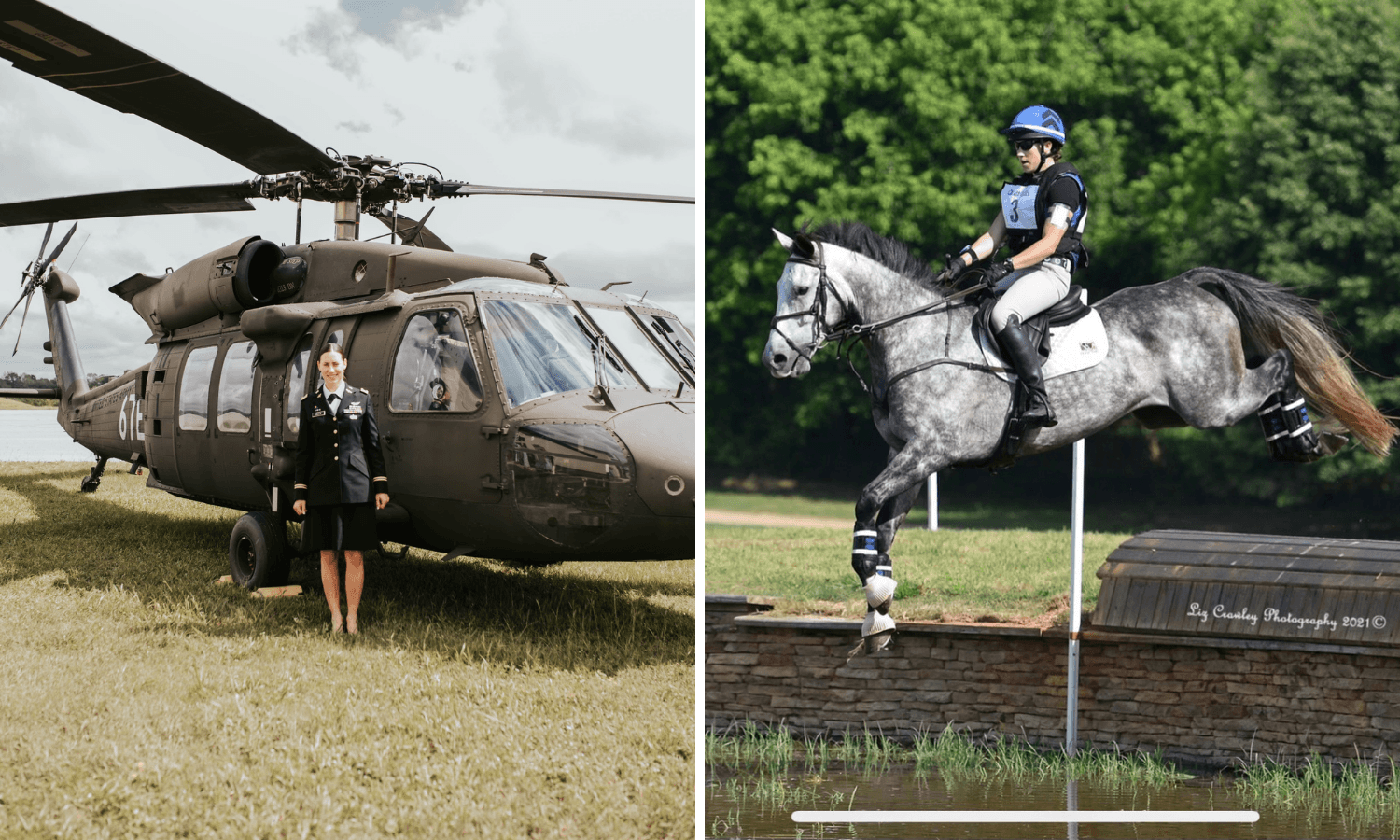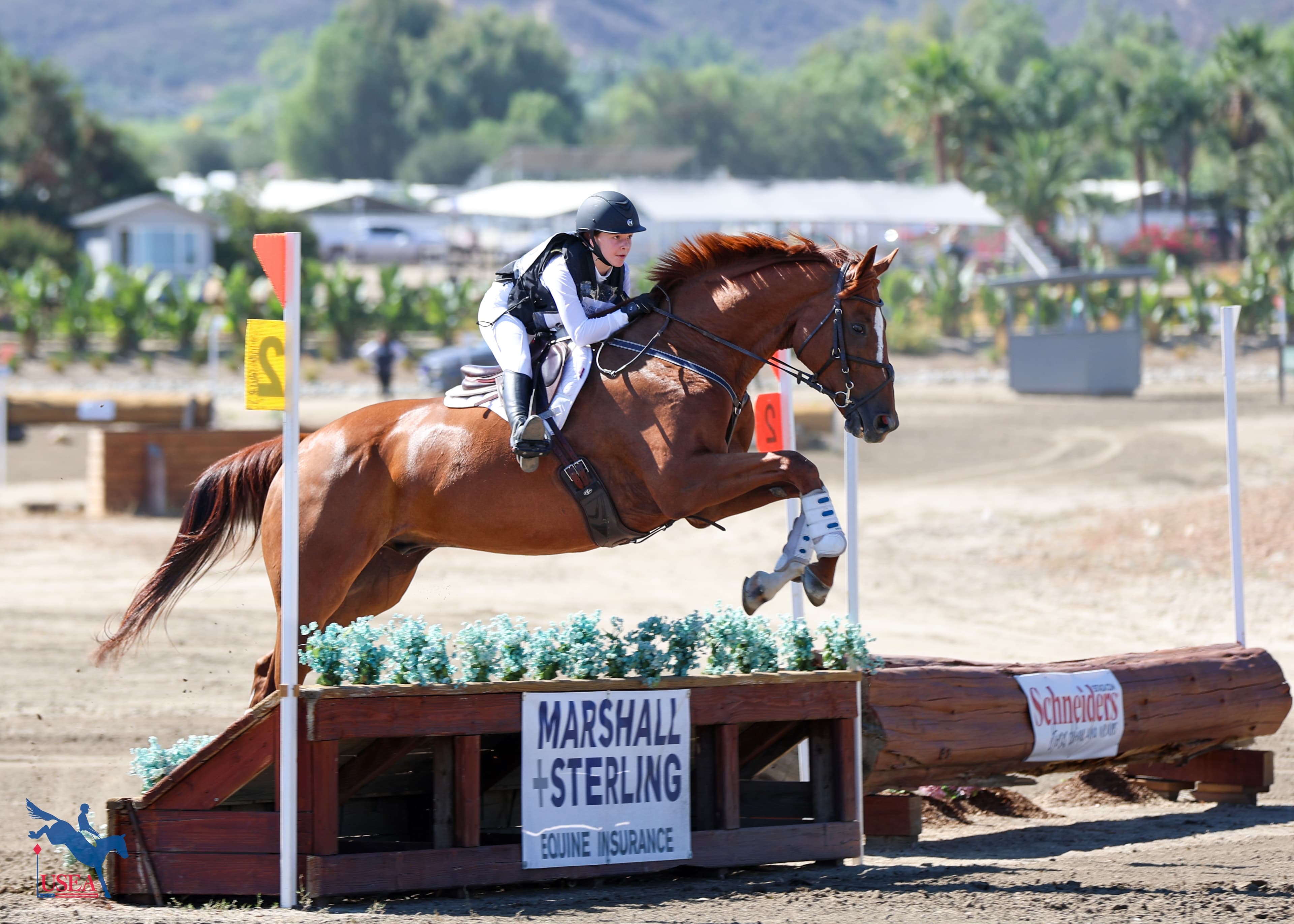Now On Course: Stephanie Sills Takes Flight Both In and Out of the Saddle

This Now On Course segment was written by Pam Sills on behalf of her daughter Stephanie Sills.
Any equestrian trying to balance their passion for horses and normal work and life responsibilities, knows that time management and perseverance are necessary to succeed. My daughter Stephanie Sills certainly needed those traits over the last two years after she was accepted into Flight School for the U.S. Army, to become a Black Hawk Helicopter Pilot.
Stephanie began her flight training in May 2020, with a seven-week Warrant Officer boot camp. Following the completion of this demanding course, she returned to West Virginia in order to retrieve her two horses and make the journey back to Fort Rucker, Alabama, where she would be stationed for the next 15 months. After settling the horses in while completing a two-week COVID quarantine, academic training started.
Following one month of academic training, a three-week survival course was next on the agenda. This training, known as S.E.R.E., required Stephanie to once again leave, with no access to phone, internet, or her horses. S.E.R.E. (survive, evade, resist, escape) was developed to train pilots and other individuals who have the potential to become stranded behind enemy lines. The training also delves into resistance and escape techniques, should one be captured and be taken hostage or imprisoned by an enemy. The training was a true test, and Stephanie came out 10 pounds lighter thanks to the dietary restrictions implemented in the three-week training course.
After the completion of S.E.R.E., and six months after first arriving at Fort Rucker, flight in the helicopter was ready to commence. Flight school is rigorous and requires extensive studying to pass the written, oral, and physical flight knowledge checks which are conducted on an all too frequent basis. It is all-encompassing, requiring constant studying and training, and is compared to "drinking from a firehose." If you do not pass, you do not move on and are pulled from the course.
Stephanie’s horses allowed her a reprieve from her studies. Fort Rucker has on-post stables where dry stalls may be rented for a monthly fee. The owner is responsible for all care, which proved challenging with a 4:50 a.m. departure time for the flight line, but thankfully Stephanie made several friends who aided with morning horse care during early morning flights. Training for the day finished anywhere between 5:00-7:00 p.m., which left both horses to be ridden at the end of the day unless one could be squeezed in on lunch break (which many other people reserved for a much-needed nap!). Once the horses were done for the night, the last hour or two before bed were utilized for studying, doing homework, and prepping for the next day’s academic class and flight.
The Fort Rucker area is not known for eventing. Stephanie found top-level eventer, Andrew Palmer who agreed to offer her lessons when she could get to him. However, competing while based in Alabama proved challenging with the work hours required at flight school.
Few events were closer than four hours, and the five-and-a-half-hour trips to Ocala had to be made after release from the flight line on Friday evening, often putting the arrival in Ocala at midnight with a Saturday morning ride time. After the event concluded on Sunday afternoon, the trip back to Alabama was made hopefully with enough time to get a good study in before a 4:50 a.m. departure the next morning.
The hard work paid off, as Stephanie arrived at Fort Rucker with two green 6-year-olds; a Holsteiner gelding named Mille Neuf Cent (Quissini x Begonia) and her Zweibrucker mare Salt (Eclipsed by Color x Seal the Deal), whom she had owned since they were 3 and 4 years old respectively. When she left, Salt hadn’t finished out of the top three at Training Level, and Mille Neuf Cent finished the 2021 season as the USEA #3 Modified horse and successfully moved up to the Preliminary and two-star level.
Her year did not come without hardships. Stephanie had a horse-related injury in January 2021, sustaining a serious avulsion fracture to her shoulder. The fracture occurred the day before entering a three-week period of simulator flying, which did not require the same physical health as piloting the helicopter. Deciding to bypass surgery (which would have guaranteed a drop from the flight program), she was allotted three weeks to attempt recovery. After the three weeks, she had to show the flight doctor that she could fully raise her arm, exhibiting an appropriate range of motion for flying. This was a tall order, as the fracture required six weeks of healing before physical therapy was allowed to start. However, where there is a will, there is a way and Stephanie passed her assessment and was allowed to resume flight training with her class on schedule.
Unfortunately, just seven months later and while still in physical therapy for the shoulder injury, she and Mille Neuf Cent sustained a fall on the Preliminary cross-country course at Chattahoochee Hills, resulting in a broken collar bone to the same side. However, her last Black Hawk flight had been completed less than 36 hours prior, therefore she had successfully completed all necessary physical requirements and had only one month of academics left.
Five weeks after her fall, Stephanie graduated from flight school. On the drive back to West Virginia she and Mille Neuf Cent had a great outing at the Modified level before returning to Preliminary. Stephanie plans to enjoy the 2022 season with Mille Neuf Cent and Salt. She will deploy after this season for a year, serving as a Medevac Helicopter Pilot for the Vermont Army National Guard. This will be her third deployment, all of which she has left her horses behind for.
The USEA is made up of over 12,000 members, each with their own special horses and experiences. The USEA's Now on Course series highlights the many unique stories of our membership. Do you and your horse have a tale to tell? Do you know someone who deserves recognition? Submit your story to Meagan DeLisle to be featured.














